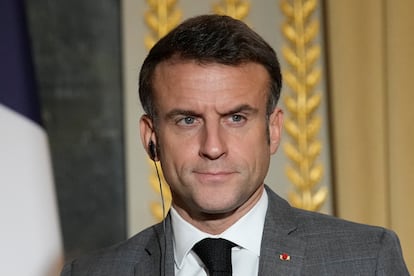A year of crises for Macron: Pension reform, protests in the banlieues and the immigration law
The French president opens 2024 with fractures within his government and the challenge of defeating the far right in the European elections in June

A turbulent year, marked by protests against the pension reform, tension in the banlieues and the adoption in December of the migration law, with the votes of the right and the far right — French President Emmanuel Macron ended 2023 with deep fractures within his government and is heading into a key period of his second and final term with the European elections in June and the Paris Olympics in July and August as a backdrop.
The last few weeks have left deep scars in the centrist government. In his traditional end-of-year televised address on Sunday, Macron gave a brief assessment of the past few months and referred to both the conflict in Ukraine and the war in Gaza. He also stressed that “the year 2024 must above all be a year of determination.” Little has transpired so far of his intentions, except that in January he will stage, as he told the newspaper Le Monde, an “appointment with the nation” with the aim of sending a “message of unity.”
Fissures exist, especially within the presidential bloc itself. The most recent one opened up with the approval of the new immigration law on December 19, after the Macronists agreed on a harsher version of the text with the right-wing Republicans (LR). A quarter of the deputies who support Macron voted against or abstained. Health Minister Aurélien Rousseau resigned. Others threatened to follow suit because of their conviction that the law crossed red lines.
The political year had already been marked by parliamentary turmoil. The French leader, re-elected in April 2022, does not have the absolute majority that allowed him to pass laws without hindrance in his first term. With a relative majority, Macron is forced to negotiate, text by text, on each reform he wants to push through. As such, the immigration law had to be renegotiated with the right after the opposition refused en bloc to debate it in the National Assembly.
The new version of the text was supported by Marine Le Pen’s extreme right-wing National Rally (RN), which was quick to claim an “ideological victory.” A section of French society voted for Macron in 2022 to prevent Le Pen from coming to power. His party is the strong favorite to win the European elections in June, according to polls. In his message on Sunday, the president made a reference to the vote, which will choose between, according to Macron himself, “continuing Europe or blocking it.”
The scars of the pension reform
Macron’s message also closed a year marked by rioting in the banlieues, triggered after the death on June 27 of a minor shot by police. In addition, the adoption in April of the pension reform caused deep wounds and highlighted the rift between the president and citizens.
Despite massive protests, strikes, and the opposition of the majority of citizens, the government approved the increase of the retirement age from 62 to 64. It did so through Article 49.3 of the Constitution, which allows for the adoption of a law without the vote of deputies. The reform, along with the immigration law, was one of Macron’s star projects during his presidential campaign. Both have cost him in terms of popularity and they have not been entirely concluded. In the case of the immigration law, the president has appealed to the Constitutional Council to verify the legality of the most controversial points. A decision will be made in January. Macron, however, insisted Sunday that the year ahead will be one of “hope” and “pride.” “This year will determine much of our future,” he stressed.
But the horizon, for the moment, is blurred. “Today there is no agenda. It is a new page to be written, and it is up to the president of the Republic to say what new chapters we are going to star in,” said the leader of the Democratic Movement, François Bayrou, one of Macron’s most loyal allies, on Thursday. Some issues are, however, already on the agenda. The president promised to enshrine the right to abortion in the Constitution in the first trimester. Voluntary termination of pregnancy was decriminalized in 1975, but there is nothing in the Constitution to guarantee it. Another issue to be debated in 2024 is that of dignified death. In France, neither assisted suicide nor euthanasia are legal. A bill will be presented in February, the president said, after several postponed debates.
In the short term, the big question mark is whether there will be a government reshuffle following the fallout from the debate on the immigration law. Macron made changes last July, albeit in a limited way, following the banlieue and pension crises. The question of how he might respond to the latest schism remains open.
Sign up for our weekly newsletter to get more English-language news coverage from EL PAÍS USA Edition
Tu suscripción se está usando en otro dispositivo
¿Quieres añadir otro usuario a tu suscripción?
Si continúas leyendo en este dispositivo, no se podrá leer en el otro.
FlechaTu suscripción se está usando en otro dispositivo y solo puedes acceder a EL PAÍS desde un dispositivo a la vez.
Si quieres compartir tu cuenta, cambia tu suscripción a la modalidad Premium, así podrás añadir otro usuario. Cada uno accederá con su propia cuenta de email, lo que os permitirá personalizar vuestra experiencia en EL PAÍS.
¿Tienes una suscripción de empresa? Accede aquí para contratar más cuentas.
En el caso de no saber quién está usando tu cuenta, te recomendamos cambiar tu contraseña aquí.
Si decides continuar compartiendo tu cuenta, este mensaje se mostrará en tu dispositivo y en el de la otra persona que está usando tu cuenta de forma indefinida, afectando a tu experiencia de lectura. Puedes consultar aquí los términos y condiciones de la suscripción digital.









































